Irritable Bowel Syndrome: How Stress Impacts Your Gut Health and What You Can Do {Lifestyle Medicine | Nutrition}
Stress, Leaky Gut & the Microbiome Play Key Roles in Irritable Bowel Syndrome. Here is What You Can to Do!
Two of the most common issues patients seek care for are stress and issues with digestion. Interestingly, these two conditions are often closely related to each other as is evident in the case of irritable bowel syndrome. Irritable bowel syndrome (IBS) is a common disorder which is often influenced by stress and is associated with an altered brain-gut axis, impaired intestinal barrier function and an imbalanced gut microbiome. Understanding these connections can help you heal and balance your gut!
Subscribe to my YouTube Channel for more Travel, Healthy Lifestyle & Recipes, Eco-Friendly Living, Mindfulness videos and more!
Affiliate Disclosure & Privacy Policy (please review our complete policy here): we use affiliate links and analytics on our website, social media posts and newsletter which utilize cookies placed on your browser to track sales activity. This post is NOT sponsored but may contain affiliate links. Please review our complete privacy policy here. Thank you for your support! These statements have not been evaluated by the FDA and should not be considered medical advice or treatment. Please consult your personal health provider before making any changes to your diet or lifestyle.
Stress: A Pervasive Lifestyle Factor With Profound Influences on Health
Emotions like stress create real physiological changes in your body, especially in the digestive tract. Stress refers to any real or perceived threat or demand and can be acute. It can be acute, such as in emergencies, or chronic and insidious.
The body reacts to stress with adaptive responses that help you maintain homeostasis and ensure survival. This interconnection between mental states and physical processes is orchestrated by the central nervous system which communicates with the autonomic nervous system to set off a series of physiologic changes in the body.
Lifestyle factors can also increase your level of stress including:
- an imbalanced, irritating or allergenic diet;
- physical over-training;
- not getting enough quality sleep;
- having a job you don’t enjoy;
- chronic pain;
- destructive thought patterns; and
- a lack of time for balance, rest and fun.
Stress, Digestion and The Autonomic Nervous System Contribute to Irritable Bowel Syndrome
The autonomic nervous system and hypothalamic-pituitary-adrenal (HPA) axis are the two main central response systems that the body uses to cope with and respond to stress. The brain has a direct impact on the digestive system via what has been coined the brain-gut axis (Kontruek. Brzozowski, Konturek, 2011). This connection makes the digestive system especially susceptible to the impacts of stress.
The brain-gut connection is facilitated by a network of nerve fibers that line the walls of your digestive tract. This active system of nerves is a branch of the autonomic nervous system called the enteric nervous system.
It is sometimes called your second brain since it receives many signals from the brain and communicates signals back to the central nervous system as well. Due to this intimate connection, it is not surprising that psychological stress, anxiety, depression and other psychiatric disorders are associated with greater frequency and severity of gastrointestinal symptoms in conditions such as IBS (Pinto-Sanchez et al., 2015).
Click here to learn more about the important gut-brain connection!
Irritable Bowel Syndrome
Irritable bowel syndrome (IBS) is a common and usually chronic disorder functional disorder of the digestive tract. This emerging knowledge of the gut-brain axis is helping to shape an explanation of irritable bowel syndrome as a stress-sensitive disorder.
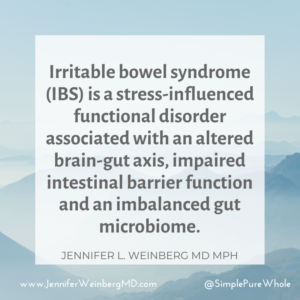
Signs and symptoms of IBS can include:
- cramping,
- abdominal pain,
- bloating,
- gas, and
- altered bowel habits such as diarrhea, constipation, or both.
IBS is often confused with other gastrointestinal disorders or not taken as seriously as it should be, given the significant physical and psychosocial impacts that can occur.
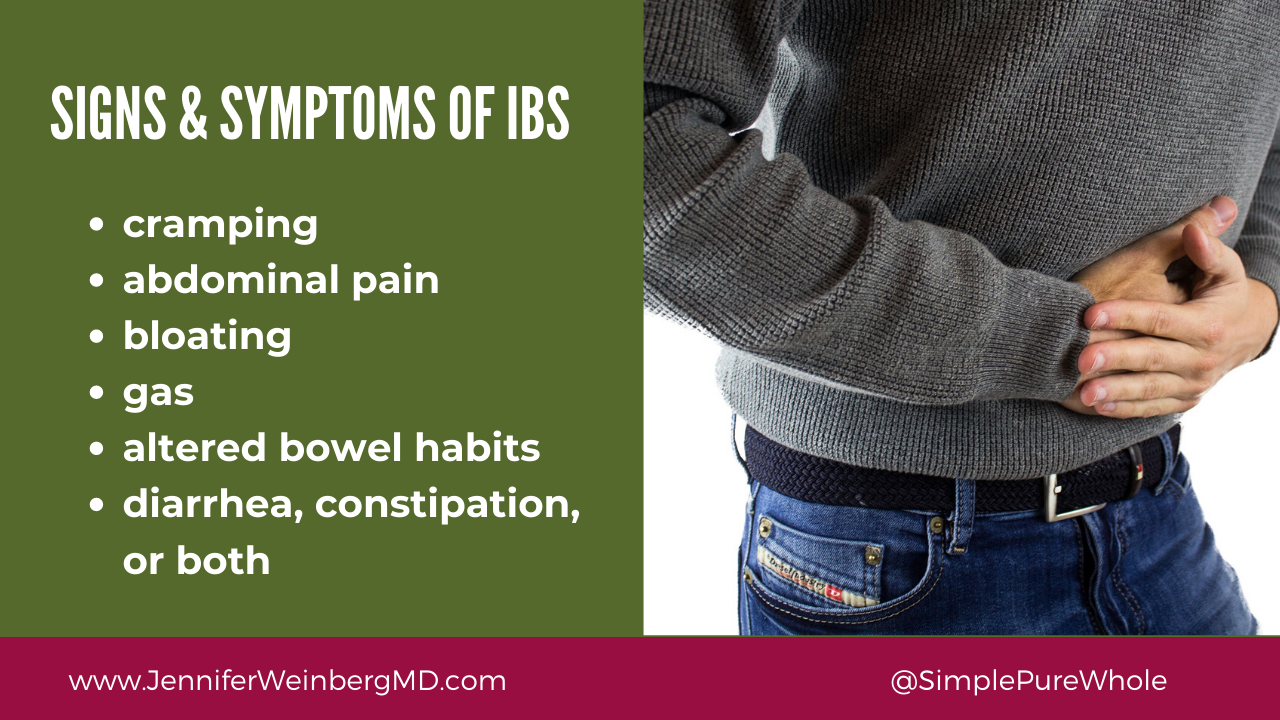
A Disorder of Altered Brain-Gut Interactions and an Imbalanced Microbiome
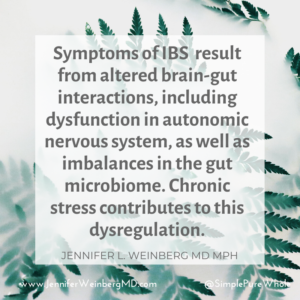 These symptoms of IBS seem to result from altered brain-gut interactions, including dysfunction in the autonomic nervous system, imbalances in the gut microbiome and a damaged intestinal barrier. Chronic stress and the accompanying altered hormonal changes contribute to the dysregulation of these systems.
These symptoms of IBS seem to result from altered brain-gut interactions, including dysfunction in the autonomic nervous system, imbalances in the gut microbiome and a damaged intestinal barrier. Chronic stress and the accompanying altered hormonal changes contribute to the dysregulation of these systems.
Not only does the brain influence the gut, but the gut also sends signals back up to influence the brain. This two-way communication contributes to many of the symptoms experienced by people with IBS. For example, research suggests that irritation in the gastrointestinal system may send signals to the central nervous system (Yarandi et al., 2016), which trigger mood changes, like anxiety and depression.
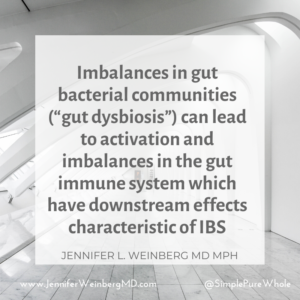 Evolving research (Holden, Naliboff, Shih et al., 2019) also demonstrates that autonomic nervous system activity both at baseline and under stress impacts bowel function and the composition of the gut microbiome. The gut microbiome is made up of microbes that colonize the digestive tract and play essential roles in maintaining human physiology.
Evolving research (Holden, Naliboff, Shih et al., 2019) also demonstrates that autonomic nervous system activity both at baseline and under stress impacts bowel function and the composition of the gut microbiome. The gut microbiome is made up of microbes that colonize the digestive tract and play essential roles in maintaining human physiology.
Evidence suggests that imbalances in these gut bacterial communities (“gut dysbiosis”) can lead to activation of the immune system in the intestines which contributes to symptoms of IBS such as visceral hypersensitivity and changes in stool form and frequency (Ohman & Simren, 2010).
Altered intestinal barrier function (“leaky gut”) may also play a role in the development of IBS symptoms. This mucosal membrane which lines the intestines can be altered (Chelakkot, Ghim, and Ryu, 2018) by:
- infections,
- poor dietary choices,
- radiation treatment,
- antibiotic use,
- chemotherapy and
- the overall composition of the gut microbiota.
For example, several enteric pathogens have been shown to have a detrimental effect on the intestinal barrier when out of balance (Paesold et al., 2002; Berkes et al., 2003; Flynn and Buret, 2008).

A Lifestyle-Based Approach to Managing Irritable Bowel Syndrome (IBS) and Improving Digestive Health
Given these findings, there are many ways to help balance the stress response, reduce overall chronic stress and improve digestive health. These approaches are based in mindfulness, stress-management, functional nutrition and lifestyle medicine approaches.
Be sure to consider these strategies in conjunction with your health care provider to find an approach that is appropriate for your unique needs.
Balance Vagal Tone with Relaxation and the Breath

The vagus nerve (cranial nerve X) is an important component of the parasympathetic (rest and digest) division of the autonomic nervous system. It facilitates communication between the brain, cardiovascular system, immune system and digestive tract (Pavlov and Tracey, 2014).
Relaxation and focused breathing exercises (like those in Breathe) increase vagal tone to provide greater autonomic balance and improve symptoms of IBS (Breit, Kupferberg, Rogler and Hasler, 2018). Deep breathing triggers the parasympathetic nervous system which activates processes involved in rest, repair and digestion. When the body is in parasympathetic mode, blood flow and oxygenation to the digestive tract is increased, making digestion more efficient.
Techniques like:
- progressive muscle relaxation,
- massage-based techniques (like this one you can do at home)
- sauna
- visualization and
- mindfulness meditation
are also effective ways to shift into a more parasympathetic state which favors relaxation and healthy digestion.
Tuning into your emotions and responses to stress and learning how to adopt healthy ways to manage stress, like those presented in The Whole Cure, can allow you to more effectively digest both food and life.
Nourish the Microbiome with Prebiotics and Probiotics
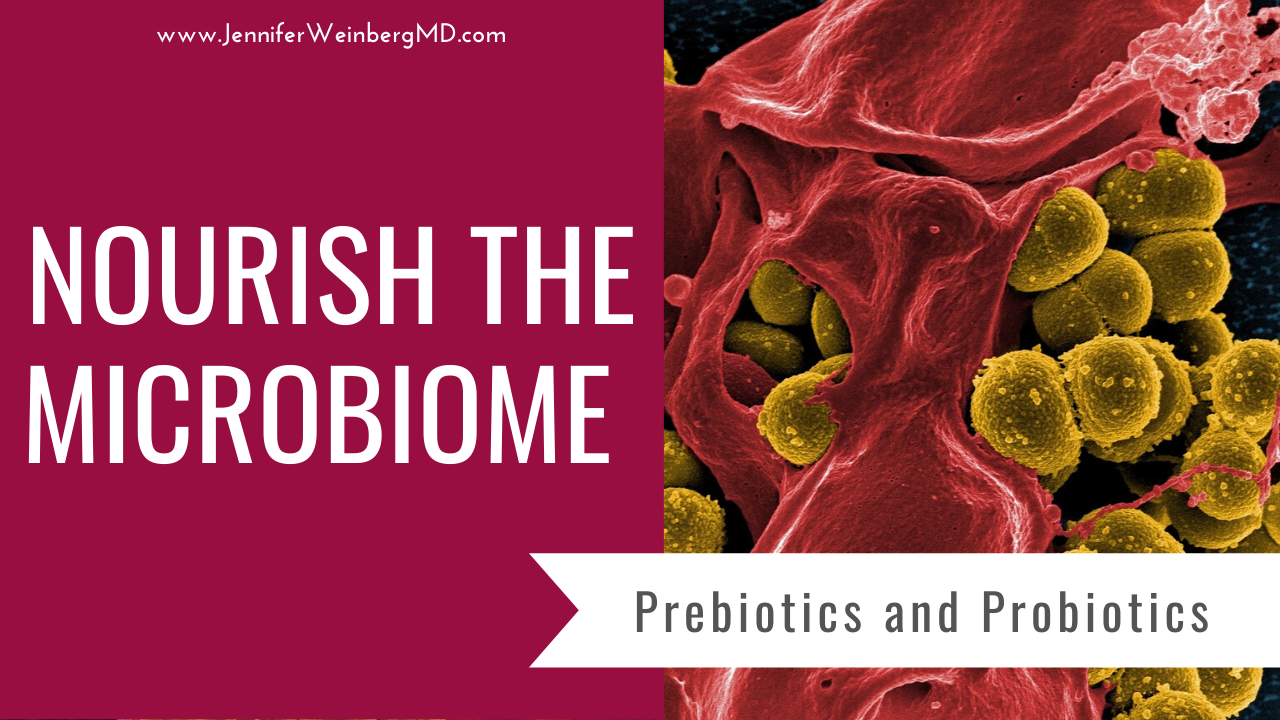
A balanced microbiome is more resistant to the negative impacts of inevitable stress. When your gut has a healthy balance of microbes, you have less intestinal permeability, improved resistance to illness and better psychological and gastrointestinal health (Karl et al., 2018).
Prebiotics are functional foods that promote the growth and/or activity of beneficial gut bacteria (Slavin, 2013). Specific types of dietary fibers are prebiotic foods that nourish healthy gut bacteria. These include:
- inulin,
- fructo-oligosaccharides (FOS),
- galactooligosaccharides (GOS) and
- oligosaccharides.
These non-digestible carbohydrates are found in foods like bananas, asparagus, onions, oats, garlic and Jerusalem artichokes.
Probiotics are live or attenuated microorganisms which can help to populate the gut microbiome when taken in appropriate amounts (Petschow et al., 2013). Including naturally fermented foods, such as raw sauerkraut and kombucha, can contribute to microbial diversity.
The term “psychobiotics” has been coined to encompass a sub-types of probiotics that may modulate the brain-gut-microbiota axis to have a beneficial effect on mood, anxiety and cognition (Dinan et al., 2013). Several studies suggest that such psychobiotics can exert an anti-inflammatory effect and improve overall symptoms in IBS patients (Ford, Quigley et al., 2014). Research demonstrates beneficial effects of probiotics on psychological symptoms in healthy individuals (McKean et al, 2017) as well as those with IBS (Pinto-Sanchez et al., 2017).
Restore and Maintain a Healthy Intestinal Barrier by Nourishing the Gut
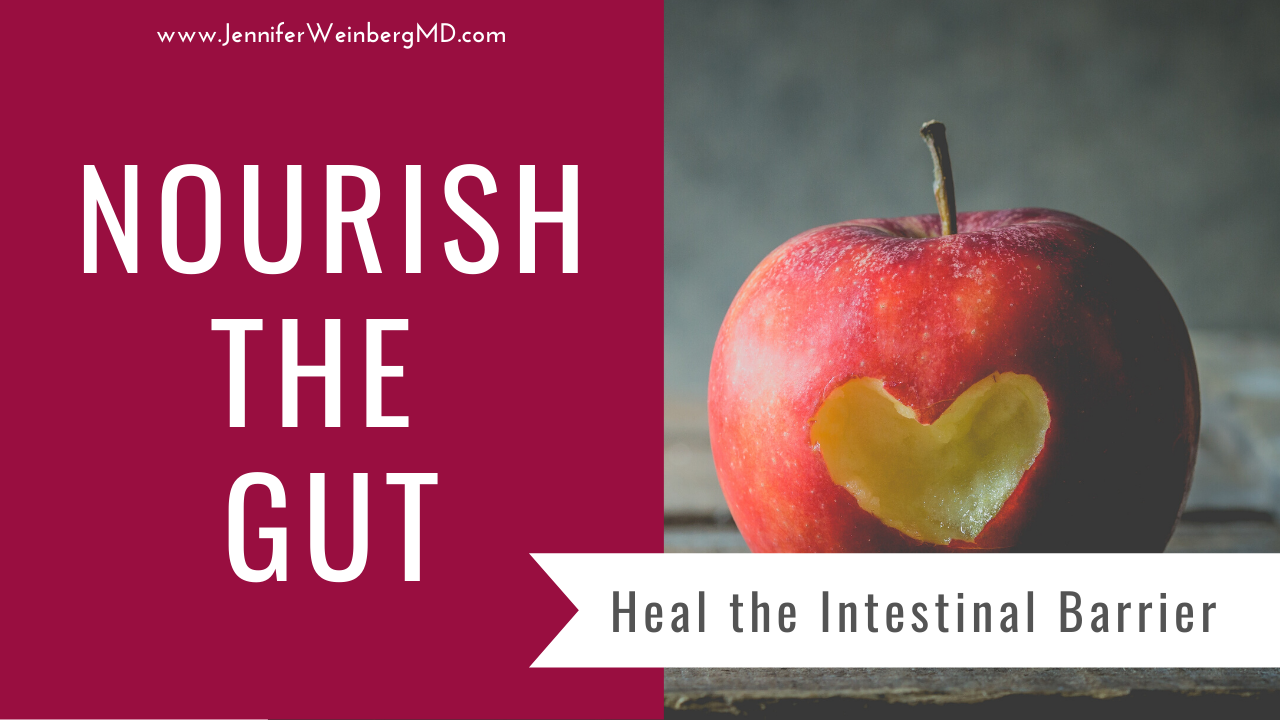
The integrity of the intestinal barrier is highly influenced by diet and the balance of the gut microbiota (David et al, 2014). A whole food-focused diet rich in anti-inflammatory vegetables, fruit and fiber can help maintain a healthy intestinal barrier. Conversely, a diet high in added sugars, artificial ingredients and processed components contributes to low-grade inflammation which leads to increased gut permeability (Frazier, DiBaise & McClain, 2011).
In particular, certain dietary components can help heal the intestinal lining (Conlon and Bird, 2015). These include:
- omega-3 fatty acids such as those in wild salmon and walnuts;
- fat-soluble vitamins A and D;
- quercetin in apples and red onions;
- EGCG in green tea;
- and curcumin in turmeric.
While anti-inflammatory fruits, vegetables and fiber can benefit some, other patients with IBS may benefit from a low-FODMAP diet. A reduction in the intake of foods that are high in fermentable oligosaccharides, disaccharides, and monosaccharides and polyols (FODMAPs) reduces GI symptoms and improves disease-specific quality of life in these patients with IBS (Austin et al., 2009). Research suggests that a low-FODMAP diet may improve the gut microbiota, restore a healthy intestinal barrier, reduce inflammation and improve visceral hypersensitivity in these patients (Zhou et al., 2016). Caution remains in this area and long-term studies are needed to assess the overall impact of a low-FODMAP diet on the gut microbiome since it excludes many foods that may be beneficial to microbial balance.
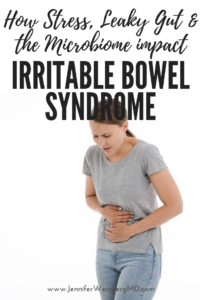
Stress is pervasive in life but the way you cope with and react to it is what determines its impact on your mind and body, including the digestive tract. This emerging understanding of the links between stress, compromised intestinal barrier function, systemic inflammation and the gut microbiome provide hope and empowering insights for taking control of your health and managing your symptoms. These healthy habits support balanced mental health and counteract the negative consequences of excessive stress on the digestive tract!
Have you noticed digestive issues when you are stressed?
Click here for more vegan, gluten-free, allergy-friendly Simple Pure Whole healthy recipes!
Mindfulness education and practice is a big part of the Simple Pure Whole Solution! Here are a few resources that can support your mindfulness practice during times of uncertainty, anxiety, fear and calm:
Mindfulness Resources for Self-Healing:



- Download your free chapters and wellness prescriptions now and get started incorporating a more mindful approach into your life and building resiliency. You can also get your copy of The Whole Cure in paperback or Kindle edition from Amazon.
- My Mindfulness Resources for Crisis and Self-Healing Package provides you with professionally-designed worksheets, handouts and workbooks for creating habits and practicing tools that support optimal stress management, resilience and coping with difficulty.
- Guided meditations and relaxation exercises from my Breathe CD.
Mindfulness Resources for Health Care Practitioners:
- If you are a health coach or other health care professional, I heard from many of you requesting done-for-you content and tools for easy-to-incorporate mindfulness practices that you could use during this time with your clients and patients. To address this need, I want to offer my Done-for-You Package of Mindfulness Resources for Crisis and Calm at 70% off the regular price. Right now you can get the complete package for only $67 here. This Done-for-You Package of Mindfulness Resources for Crisis and Calm provides professional mindfulness resources for coaching and sharing self-healing tools and practices to empower you to teach others how to disconnect from panic, fear and anxiety and build inner peace.
- My newest done-for-you workshop package Rest, Restore & Rejuvenate to Mindfully Manage Stress is the perfect way to offer support for stressful times and everyday optimal health. You can use this completely done-for-you workshop package with your clients or for a virtual teleworkshop or series of sessions. You get everything done for you, from a complete word-for-word script to handouts for your clients to a guided exercise to a complete instruction guide so you are ready to confidently share this guidance with people right away.
I would love to have you in my Insider’s Community! Join for free to subscribe to my email newsletter and receive your BONUS of FREE Chapters from The Whole Cure: 52 Essential Prescriptions to Overcome Overwhelm, Reclaim Balance and Reconnect with a Life You Love! You can pick up a full paperback or Kindle copy on Amazon (affiliate link) for a wealth of insights, exercises and complete toolkit to help you uncover your true passions, authentic purpose and calm confidence as well!
To keep building your healthy lifestyle and best self through everyday habits, take the next step today to commit to a life you truly love and feel fully alive!
-
Pick up a copy of The Whole Cure (affiliate link) to build resilience and manage stress in a way that makes life flow with greater ease and joy!
-
Access guided relaxation exercises utilizing the power of the breath and mind here.
-
Join my next online group Whole Cure Lifestyle Transformation Programs to build more powerful coping strategies and skills for meaningful stress management and a calmer life! Contact me to form your own guided online group or register for the next scheduled online program!
Medical Disclaimer: Information provided in this post and related resources are for informational purposes only. Jennifer Weinberg is not providing medical advice, diagnosis or treatment information. The information is NOT intended as a substitute for the advice provided by your physician or other healthcare professional. Every body is unique so be sure to check with your healthcare professional before making any dietary or lifestyle changes taking any medication or nutritional supplement or using any treatment for a health issue. Do not use this information provided for diagnosing or treating a health problem or disease. If you suspect you have a medical problem please contact your healthcare provider promptly and do not disregard professional medical advice based on anything on this website. This website and related resources are not intended to diagnose, treat, cure or prevent disease and do not create a doctor-patient relationship between you and Jennifer Weinberg. These statements have not been evaluated by the FDA. These products are not intended to diagnose, treat, cure, or prevent any disease.
This post was shared with:
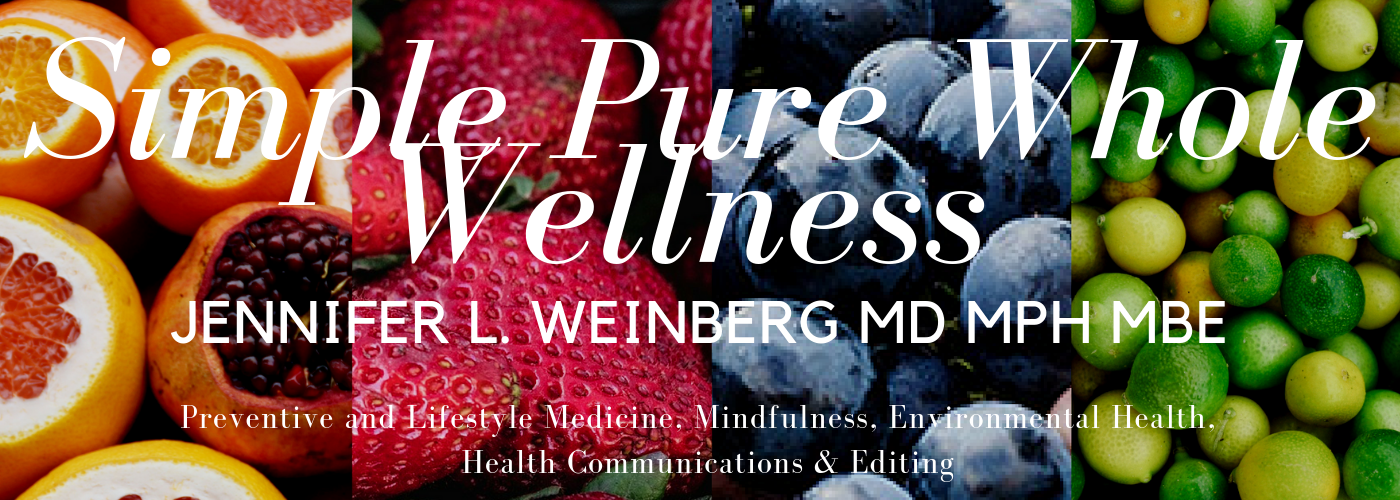

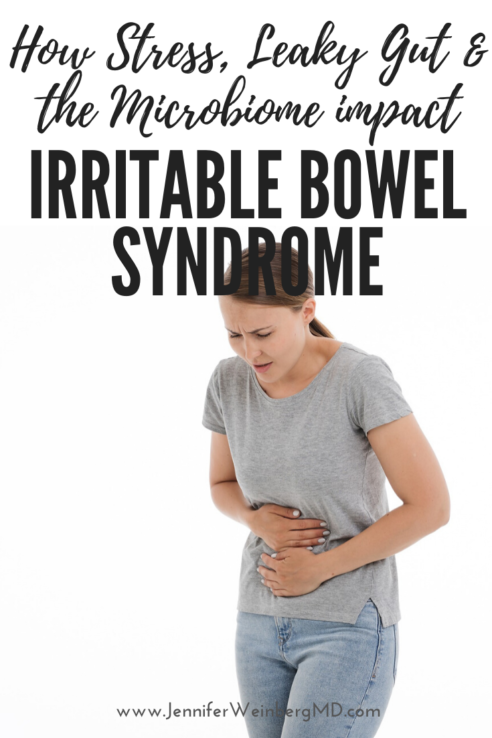

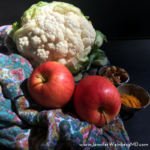
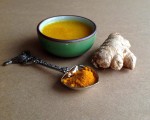


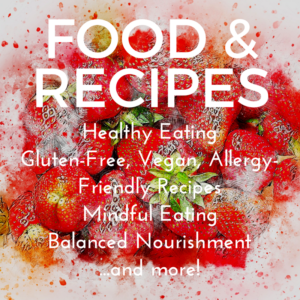



Comments